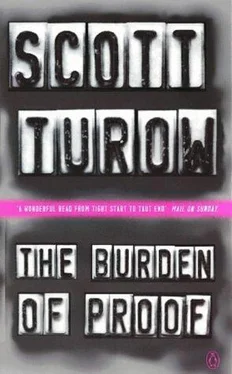Scott Turow - The Burden of Proof
Здесь есть возможность читать онлайн «Scott Turow - The Burden of Proof» весь текст электронной книги совершенно бесплатно (целиком полную версию без сокращений). В некоторых случаях можно слушать аудио, скачать через торрент в формате fb2 и присутствует краткое содержание. Жанр: Детектив, на английском языке. Описание произведения, (предисловие) а так же отзывы посетителей доступны на портале библиотеки ЛибКат.
- Название:The Burden of Proof
- Автор:
- Жанр:
- Год:неизвестен
- ISBN:нет данных
- Рейтинг книги:3 / 5. Голосов: 1
-
Избранное:Добавить в избранное
- Отзывы:
-
Ваша оценка:
- 60
- 1
- 2
- 3
- 4
- 5
The Burden of Proof: краткое содержание, описание и аннотация
Предлагаем к чтению аннотацию, описание, краткое содержание или предисловие (зависит от того, что написал сам автор книги «The Burden of Proof»). Если вы не нашли необходимую информацию о книге — напишите в комментариях, мы постараемся отыскать её.
The Burden of Proof — читать онлайн бесплатно полную книгу (весь текст) целиком
Ниже представлен текст книги, разбитый по страницам. Система сохранения места последней прочитанной страницы, позволяет с удобством читать онлайн бесплатно книгу «The Burden of Proof», без необходимости каждый раз заново искать на чём Вы остановились. Поставьте закладку, и сможете в любой момент перейти на страницу, на которой закончили чтение.
Интервал:
Закладка:
The image is of some X-ray shadow, a form in negative space; opening and breathing, closing, clinging, like the wings of a moth in the dark, the walls of the heart.
Now that same woman had turned him loose in late-century America, where standards for sexual performance were touted on the covers of the magazines sold at the checkout stand right there behind the broad store window. Was he prepared for this? The uncomfortable truth was that he had no past to brag about, no comforting memory of the wild oats sown by young Alejandro Stern. Geography, as he thought of it, had been against him. Argentin. a, with its gauchos and machos and so forth, probably would have been a more propitious place to pass his adolescence. Male, lust was better accepted there, a legacy of the nation's Italian and Spanish forebears. His brother, even at the age of fifteen and sixteen, was an impressive roue. He had many women, or at least claimed to: whores, Indian girls, older women lusting for youthful energy. Stern could still clearly recollect listening awestruck to Jacobo's account of his initiation, at the age of thirteen, with a very thin young woman attired in a black strapless evening gown, who had met him in the lobby of the Roma, a seedy downtown hotel in B.A. Months later, Jacobo contended he recognized her on the sweet in a habit, walking with her sunken eyes, amid a row of novices leaving the Convent of Santa Margarita.
Stern, forty-five years after the fact, found the thought of this woman as imagined, with her sunken eyes and small breasts, disturbingly provocative.
But his youth in America in the fifties had contained nothing so exotic.
The Puritans reigned once more here, and sexuality seemed to be a particularly unbecoming trait for a dark foreigner, a suspect impulse like fellow traveling.
Lust was one more wild hunger that he willingly constrained for future satisfaction, even with Clara, with whom he would not have slept before their wedding but for her insistence that they were more likely to enjoy the honeymoon if they could leave this particular anxiety behind. And so, two weeks before the ceremony, in Pauline Mitfier's parlor full of Oriental brocades and Viennese glass, with all the lights still burning for fear that someone in the house might notice, Clara had wriggled from her girdle and her hose, lifted her skirt, and lain back on her mother's red divan. For many reasons, that had struck Stern as an act of astonishing trust. And he? He was terrified and, because of that, also somewhat affronted, angered by the indignity 'of these shabby mechanics.
Thirty-one years later, those emotions remained real to him, near at hand in the dark auto, the peculiar residue of a night of high feeling in which he had been confused and stimulated and put out. But he had proceeded; he remembered that as well. He had fiddled interminably to release his erect penis from the bindings of his trousers, and Clara Mittlet had become the first-the only-woman in his life.
Stern had first seen Chicago when he was thirteen, near the end of the overland passage his mother and Silvia and he had made from Argentina.
That journey had been impelled by his mother's involvement with a man named Gmengehl, a lawyer who had been showing her great interest since, it seemed, the moment of his father's death. Gruengehl was a figure in one of the few anti-Peronist unions, and following his jailing, his friends and colleagues had swept into his mother's house to help them pack, their mute for exile already arranged. In 1947, with displaced persons throughout Europe claretring for entry to the United States, and Argentina's diplomatic ties to the U.S. questionable after the war, legal immigration was problematic. Instead, they traveled by train to Mexico City, and then were driven across the border, looking like one more family of braceros. In Brownsville they boarded a train North.
Stern even so young, had known that Argentina was not his destiny. His father, a physician, had left Germany in 1928 and forever mourned that the Nazis prevented his return.
Papa always unfavorably compared life in Argentina to what he had known before: the quality of goods, of music, of building materials, of people was sadly lacking in his eyes. Jacobo, whom Stern so admired, had become an ardent Zionist and preached from the time Stern was nine or so the glory of Eretz Israel. When Stern stepped off the train in Chicago, he believed his life had started. They went on to Kindle County, where cousins of his father's were waiting, but Chicago would always be what he thought of as America, with its massive, soot-smeared buildings of brick and stone and granite, full of smokestack arms and sullen, teeming throngs, the land of Gary Cooper, of steel, skyscrapers, automobiles. He recognized in every face that day the striving.children of immigrants.
More than four decades later, Mr. Alejandro Stern returned, a man of prominence with his own troubles. On the fifth floor of the Chicago Exchange, he sat in the walnut conference room at Maison Dixon, thumbing through documents he could not comprehend. Outside, the vast trading room of MD burned on, eighty young men and women, casually dressed, each behind a telephone console blinking with the action on twenty lines, and a pillar of cathode-ray tubes. Across these glowing screens darted figures, flashing by briefly like fish in the sea, a matrix of dollars and cents, beans and oil, fast markets and bulletin items, high, low, open, volume, change. The telephones chirped like crickets, and different voices occasionally gained ascendance. "Anybody here want to buy old bonds at 6 plus?… It's moving, it's moving."
"I'm going to hedge you up on the D-marks."
Between calls, these young people, working customer and managed accounts, would offer to the entire room a hip, sardonic commentary. One fellow whined in a mock accent of some kind, "Oh, the market, she is just like a woo-man, first she wants you, then she don't, she won't never make up her mind." An attractive young blonde beside him inclined her middle finger in response.
"Got it all figured out?" Margy Allison, Dixon's chief operating officer, had returned for a moment to check on his progress. She had been in this business most of her adult life, almost exclusively for Maison Dixon, and, apparently, still found it thrilling. Nothin' to it, she seemed to suggest, as she motioned to the stacks of paper around Stern-even a silly old Okie gal could git it. Margy loved to do routines like that, for the amusement of her friends up North. An M.B.A., she preferred to come on like an oilfield roughneck. 'Mar-gee,' she would say, when introducing herself. 'Hard g. Hard girl."
"I believe we shall need an accountant," Stern told her.
Margy made a face. She was the paymaster in these parts and a legend for her tightfistedness. Every time she signed a check, she told you what a dollar used to buy in the country.
"I can put all that stuff together for you."
She was capable, no question, but unlikely to find the time. With the advent of overseas trading, and night sessions of the markets, Maison Dixon was open twenty-four hours a day, and there were problems to solve at every juncture. At her door at any hour, there was usually a line: clerks and secretaries and boys up from the floor in the unstructured jackets with the large square plastic badges on the pockets. Stern, accordingly, told her she could not afford to spend the hours this job would require.
"If you're billin' us your usual hourly rate, Sandy, I can afford a lotta time." She smiled, but her point, of course, was made. "I'm sure you got one of those hotel rooms like you usually do when we're payin, big enough to hold the opera with the elephants. We can take this whole mess there and look it over. Assumin a' course"-Margy hooded her shadowed eyes-"you're willing to chance bein alone with me." She cast herself in a vampy role, a female sexual braggart. It was part of her 1ov routine, coming on tough and crude, like the kind of woman you imagined finding smoking a cigarette at the bar of some mid-city lounge.
Читать дальшеИнтервал:
Закладка:
Похожие книги на «The Burden of Proof»
Представляем Вашему вниманию похожие книги на «The Burden of Proof» списком для выбора. Мы отобрали схожую по названию и смыслу литературу в надежде предоставить читателям больше вариантов отыскать новые, интересные, ещё непрочитанные произведения.
Обсуждение, отзывы о книге «The Burden of Proof» и просто собственные мнения читателей. Оставьте ваши комментарии, напишите, что Вы думаете о произведении, его смысле или главных героях. Укажите что конкретно понравилось, а что нет, и почему Вы так считаете.












